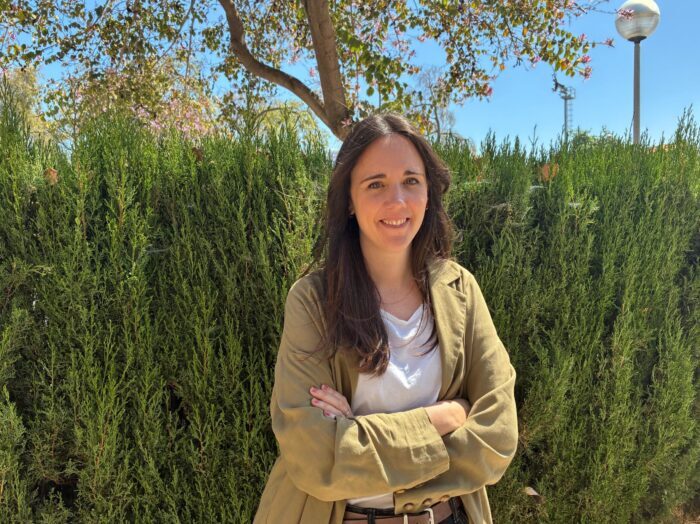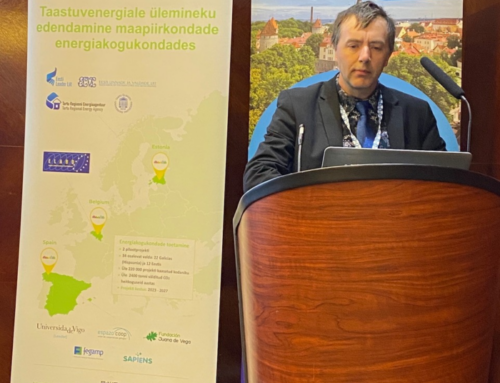“Our vision is to place energy in the hands of people”
Sapiens Energia is a Renewable Energy Community specialized in the creation and dynamization of energy communities in collaboration with local authorities and constitutes a pioneer in the development and implementation of energy communities in Spain. Since January 2020, its team has accompanied more than eighty municipalities throughout Spain to start the path of the community energy transition. They are now contributing their experience to the EC4RURAL project. The project manager Nerea Soro tells us about their experience in Galicia.
Could you introduce us to Sapiens Energía and the work that your entity carries out in the EC4RURAL project?
Sapiens Energía is a cooperative focused on promoting a fair and participatory energy transition. In EC4RURAL, we contribute our expertise in both the technical development of renewable energy communities and the design of inclusive, citizen-driven processes. Our role is to ensure that the energy transition reaches rural areas through real, sustainable, and community-led models that empower local people and create social and environmental value.
At Sapiens Energia, we have experience supporting the creation and launch of over 80 energy communities with collective installations. This gives us a key strategic perspective for this project, as well as the technical expertise needed to overcome barriers efficiently and identify the best opportunities for each specific context.
One of our key tasks in EC4Rural project is to develop feasibility studies and technical-economic models for renewable energy communities (RECs) in rural municipalities of Galicia. We lead the structuring of pilot projects for collective self-consumption, analysing aspects such as solar resource availability, technical sizing, economic viability, administrative procedures, and community engagement strategies. These studies serve as a foundation for the creation and implementation of legally constituted energy communities.
What tasks are you in charge of?
I am in charge of managing the role of Sapiens Energia in EC4RURAL project. This includes planning and supervising the contributions of our internal team across different areas such as engineering, consultancy and training, finance, … and ensuring alignment between these roles. I am also responsible for coordinating our contributions with the rest of the project partners, especially regarding tasks, deliverables, and milestones.
What would you highlight about the situation of the municipal energy system of the municipalities analysed in Galicia? Is there an opportunity to support the clean energy transition?
At Sapiens Energía, we have been working in rural areas for over five years. The EC4RURAL project has once again confirmed that each municipality is unique, and that the local context largely depends on the people we engage with in each place. Many municipalities face similar challenges, such as outdated energy infrastructures, low population density, high levels of aging population, and limited technical and financial resources.
I am an optimistic person who tries to see the opportunities — and there are plenty. This rural context, together with the deep insights we gain through the project, carries out unique opportunities: strong community ties, local leadership willing to innovate, and a growing awareness of the need for energy sovereignty.
We learn by doing, as building an energy community involves creating new governance structures, redefining citizen roles, and adapting technologies to rural realities.
EC4RURAL proves that with the right support and citizen participation, rural areas can lead the energy transition that not only improves energy resilience but also strengthens local identity, economy, and social cohesion.
What do citizens say when you explain to them that they are going to become ‘prosumers’? It is a concept that, at first, must come as a shock to them.
At Sapiens, our vision is to place energy in the hands of people. That’s why, when we use the word prosumer and talk about individuals producing and consuming their own energy, it helps us make this vision visible and tangible. For us, people are not just beneficiaries — they are active participants and key drivers of these processes.
At first, prosumer sounds different to what they are used to, but the word itself helps as it sounds as “producer” and “consumer”, so when we explain that it means they can generate and consume their own electricity (reduce bills, take part in collective decisions), we empower them to take control of their energy.
For many people, it’s the first time they are involved in energy decisions, not just being passive consumers. I believe that the word ‘prosumer’ reflects active involvement, not a passive role, so I would say we can make proud use of this word as it becomes more and more familiar to society.
From your experience, is the evolution of technology, and its greater accessibility, a lever to boost Rural Energy Communities?
Technology is necessary, but not sufficient. In projects like this one, we face two types of challenges: technical challenges and adaptive challenges. These can be addressed through the knowledge and experience of the organizations involved, as well as with the support of appropriate technologies.
Moreover, technology also plays a key role in helping us tackle adaptive challenges. For example, an energy study carried out using various technological tools becomes a means to raise awareness, foster understanding, and even actively engage people in the project.
We need to make good and strategic use of technology.
“Collective self-consumption makes projects viable even with moderate solar production.”
This project is being developed in Estonia and Galicia, where there are fewer solar resources than in Mediterranean countries, for example. To what extent can this lesser amount of sunshine be an obstacle to the successful implementation of RECs in these two regions?
While solar potential is lower, it should not be a barrier.
Building on the previous point, technological progress is enabling installations to become increasingly efficient in both energy generation and consumption. Moreover, in recent years, we have seen significant advancements in storage technologies.
The key is designing installations adapted to local conditions, not only weather but consumption patterns, legal context, cultural values, consumer´s needs,… Collective self-consumption makes projects viable even with moderate production.
Bio
Nerea Soro leads the energy communities division at Sapiens Energía, a Valencia-based cooperative committed to the transition towards a fairer and more participatory energy model. In her role, she coordinates the cooperative’s involvement in European projects, ensuring that its mission — returning the power of energy to the people — remains a transformative axis of the energy system.
With a strong background in sustainability, customer experience, and the management of social&environmental impact projects, Nerea supports energy communities in reaching their full potential, fostering their efficiency and autonomy. She holds a degree in Environmental Sciences from the Autonomous University of Madrid and a Master’s in Environmental Law.





